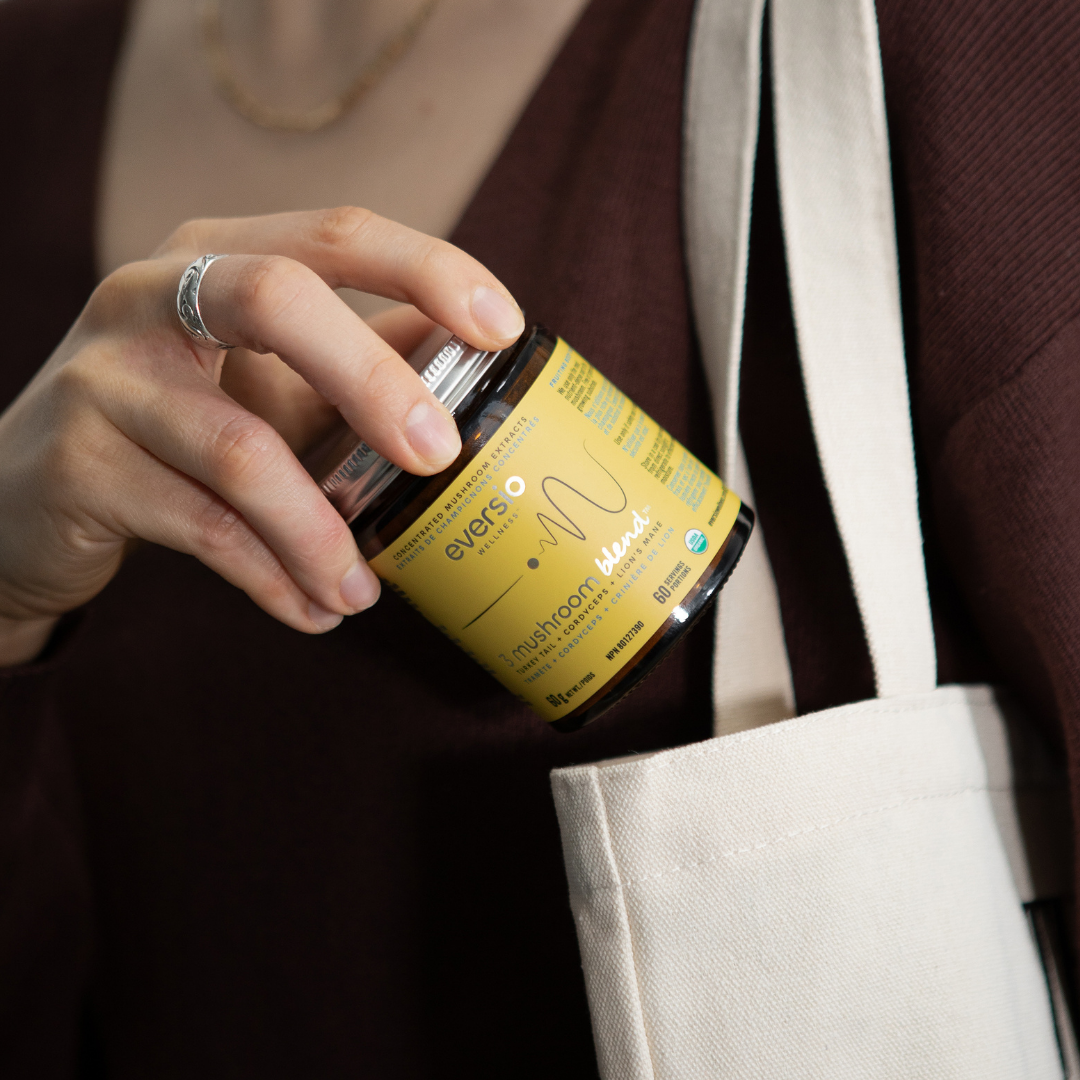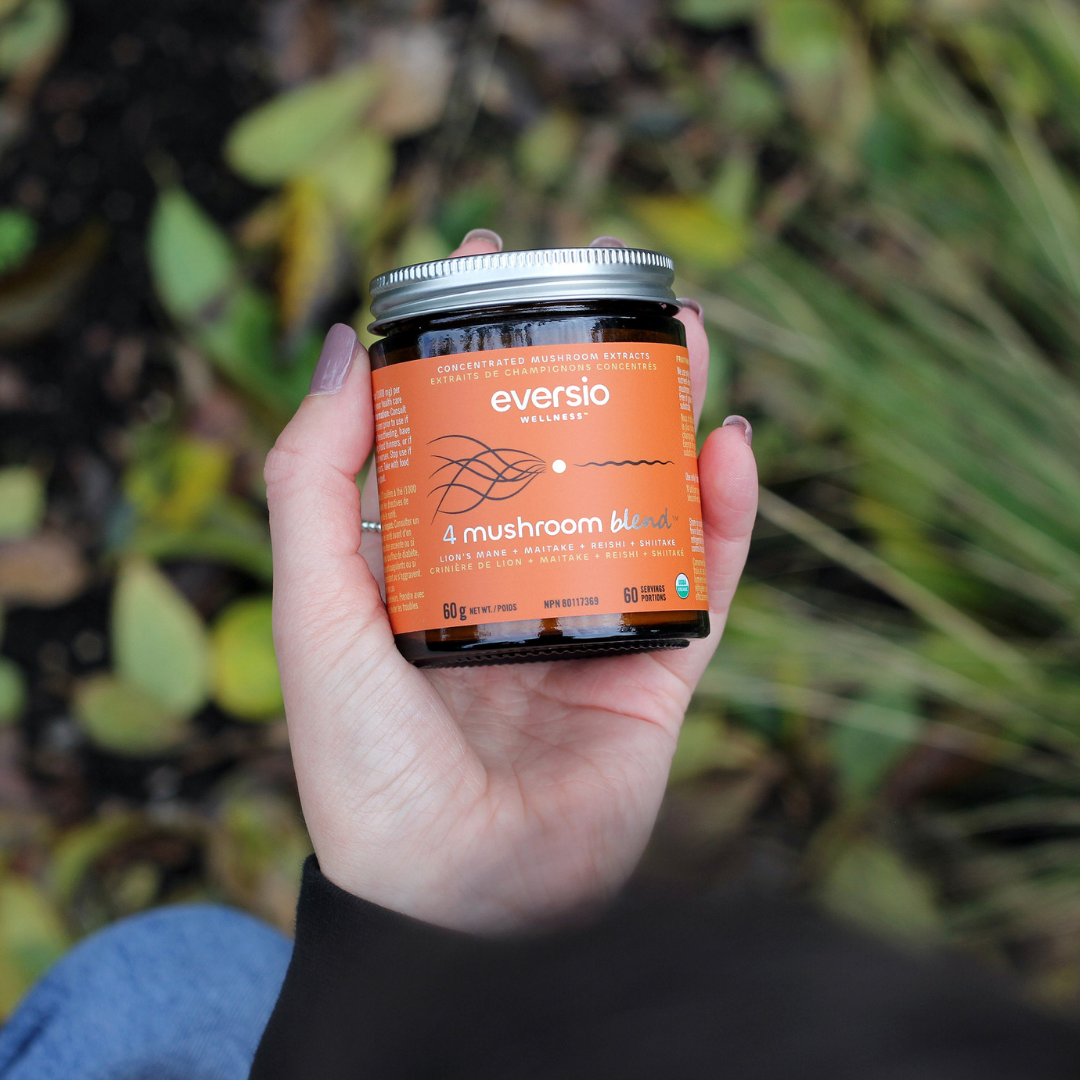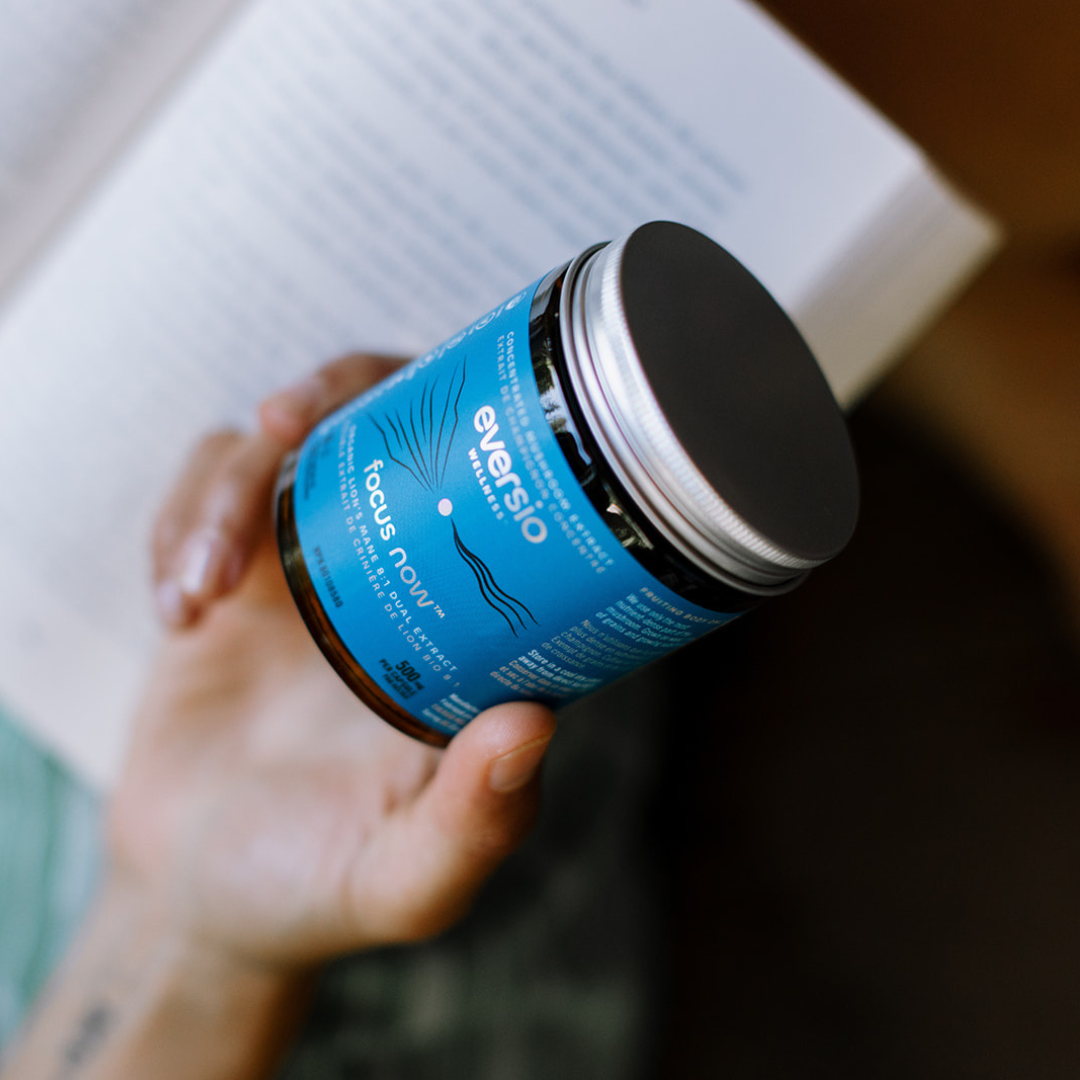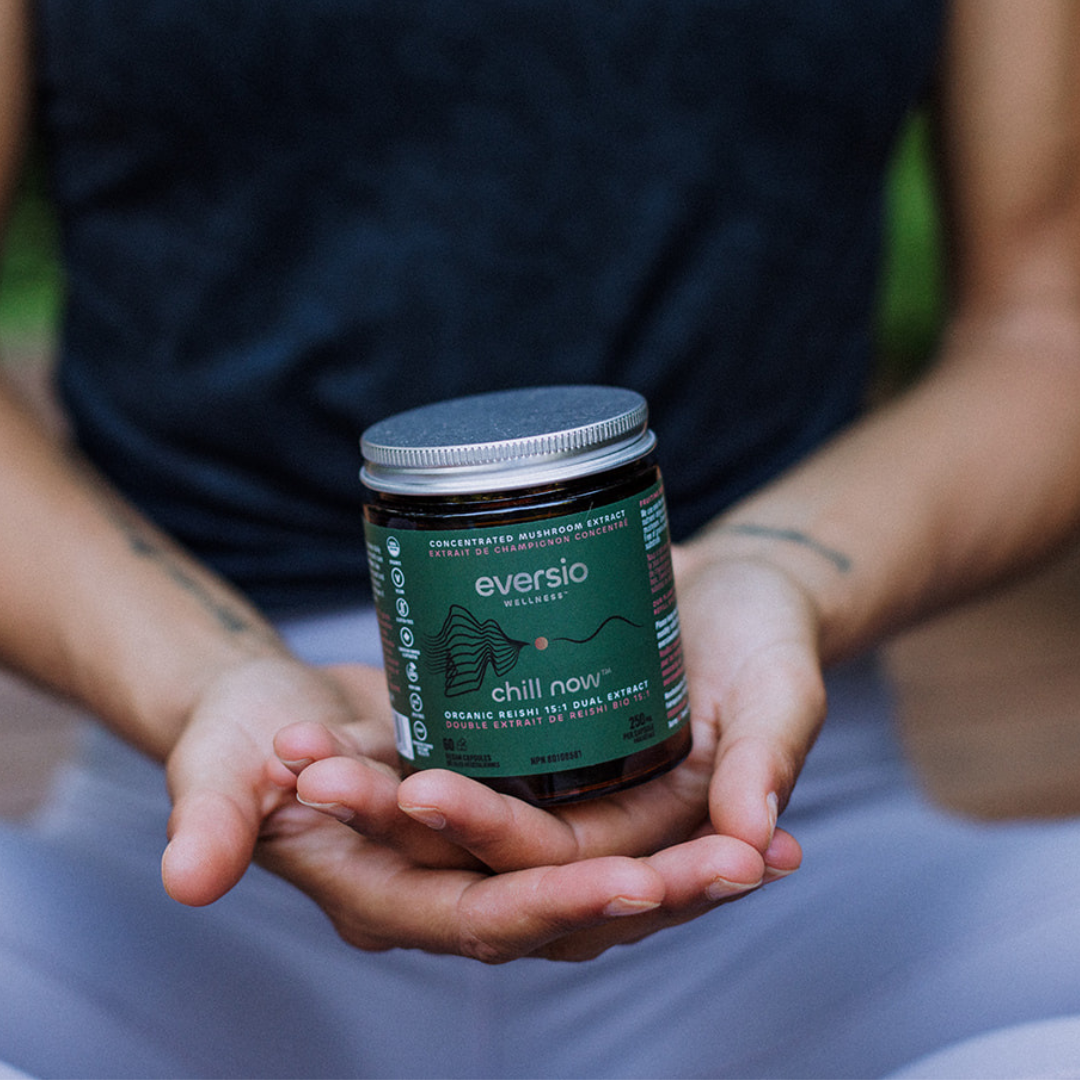September 10, 2024 | Dr. Silvana Jakupovic, ND
Mushroom Supplementation and Glutathione
In recent years, the world of nutrition and wellness has been increasingly captivated by the potential of functional mushrooms. These unassuming fungi, often hidden within the forest undergrowth, have emerged as unsung heroes in the realm of health, offering a myriad of benefits that extend far beyond their culinary appeal. One particularly intriguing area of study has emerged among the many facets of mushroom benefits: mushroom-based glutathione modulation.
Glutathione, a potent antioxidant, is pivotal in detoxification and immune system support. Glutathione synthesis and glutathione production are critical for overall well-being, and specific mushroom bioactive compounds have been shown to have a profound impact on this process. In this blog, we dive deep into the world of mushrooms and their fascinating connection to glutathione, shedding light on their antioxidant properties and their potential to revolutionize the way we think about health and wellness.
Glutathione in Cellular Protection
At the heart of understanding the significance of functional fungi in bolstering our health lies a fundamental appreciation for the role of glutathione within the body. Glutathione, often hailed as the body's master antioxidant, is a tripeptide composed of three amino acids: cysteine, glutamine, and glycine. This molecule wields an extraordinary influence over our cellular health and well-being. Its primary function is to serve as one of the body's most potent detoxifying agents, working tirelessly to neutralize harmful free radicals and toxins that can wreak havoc on our cells.
To appreciate how mushrooms come into play, we must explore the intricate world of glutathione metabolism. The synthesis of glutathione relies heavily on the availability of its precursors, particularly cysteine, which is often considered the limiting factor in glutathione production.
Herein lies the pivotal link between mushrooms and glutathione—certain species contain unique mushroom compounds that not only stimulate the body's glutathione synthesis pathways but also provide the essential amino acids and glutathione precursors needed to bolster this crucial antioxidant's levels, ultimately promoting cellular health and fortifying our body's oxidative stress reduction.
Glutathione Role in Detox
Oxidative stress, characterized by an imbalance between the production of reactive oxygen species (ROS) and the body's ability to counteract their harmful effects with antioxidants, is a factor in developing numerous health problems and conditions. ROS, which includes free radicals and peroxides, are highly reactive molecules that can damage essential cellular components such as DNA, proteins, and lipids.
This oxidative damage is implicated in the pathogenesis of various diseases and conditions, including cardiovascular diseases, neurodegenerative disorders like Alzheimer's and Parkinson's, cancer, diabetes, and inflammatory conditions. Additionally, oxidative stress plays a crucial role in aging processes and contributes to the deterioration of various bodily systems over time.

Mushroom-Derived Antioxidants: Cordyceps
In one study, researchers aimed to explore the potential antidiabetic properties of Cordyceps militaris in streptozotocin (STZ)-induced diabetic male rats and found its antioxidant potential significant [1]. They divided the rats into groups and administered Cordyceps orally for 21 days. The results showed that Cordyceps demonstrated a notable reduction in malondialdehyde levels, indicating a decrease in oxidative stress, while concurrently enhancing glutathione and catalase levels, two crucial antioxidant parameters [1].
This study highlighted the beneficial effects of Cordyceps in mitigating testicular damage caused by oxidative stress and enhancing sexual performance in diabetic male rats, suggesting its potential as a therapeutic agent for diabetes-related reproductive complications by decreasing oxidative stress.

Glutathione Regulation through Mushrooms: Reishi
Several factors can decrease levels of glutathione within the body. Chronic exposure to environmental toxins, such as air pollution and heavy metals, can deplete glutathione stores. Additionally, poor dietary choices can decrease glutathione levels, including a lack of foods rich in glutathione precursors like cysteine and inadequate intake of essential nutrients like selenium.
Furthermore, aging and chronic stress reduce the body's ability to synthesize glutathione efficiently. One study concerning Reishi’s ability to improve liver function found that consumption of the Reishi mushroom extract prevented the decrease of glutathione [2].
Reishi mushroom, scientifically known as Ganoderma lucidum, exhibited noteworthy modulatory effects on the enzymatic activity of hepatic phase 1 and phase 2 biotransformation enzymes [2]. The administration of Reishi mushroom extract effectively impeded the elevation of serum alanine transaminase (ALT) levels, which are indicative of hepatic damage, and mitigated the accumulation of liver triglycerides [2].
Furthermore, the extract exhibited a protective role by preserving crucial hepatic antioxidants in the body, such as superoxide dismutase (SOD) and glutathione (GSH), while concurrently inhibiting the activity of β-glucuronidase, a marker associated with liver injury [2]. In summary, Reishi demonstrated a substantial capacity to improve indicators of liver health and combat oxidative stress.

Glutathione Boosters: Shiitake and Maitake
In a randomized, double-blind, placebo-controlled study, the effects of Lentinus edodes, commonly known as Shiitake mushroom, on individuals with borderline high cholesterol levels were investigated [3]. This culinary-functional mushroom, rich in protein, fiber, vitamins, minerals, antioxidant compounds, and β-glucans, demonstrated notable benefits. The study revealed that participants consuming Shiitake bars experienced a significant 10% reduction in triglyceride levels after 66 days, indicating a potential role in mitigating cholesterolemia [3].
More importantly, the consumption of Shiitake led to a noteworthy improvement in oxidative stress biomarkers, particularly in elevating reduced glutathione, a critical endogenous antioxidant, while reducing lipid peroxidation. Although some individuals exhibited sensitivity to Shiitake, this study underscores the potential of Lentinus edodes as a nutritious and functional mushroom food source that positively influences redox status and may prevent the development of oxidative stress.
Maitake mushrooms are recognized as a potent reservoir of vitamin B3, scientifically called niacin or nicotinic acid. Vitamin B3 serves as a pivotal precursor for the generation of two crucial coenzymes, namely, nicotinamide adenine dinucleotide (NAD) and nicotinamide adenine dinucleotide phosphate (NADP) [4]. These coenzymes act as cofactors, participating in various enzymatic processes vital for cellular functions [4]. Notably, elevated NAD levels exhibit a profound capacity to impede the production of reactive oxygen species (ROS), an excess of which can compromise immune cell activity, culminating in immunosuppression [4,5].
Moreover, niacin supplementation has demonstrated the capacity to augment glutathione levels while diminishing malondialdehyde levels, a recognized marker of oxidative stress [4]. These findings underscore the potential of Maitake mushrooms and niacin in orchestrating a harmonious interplay within cellular processes, with implications for bolstering immune function and mitigating oxidative stress.

Glutathione Synthesis Boost: Chaga
Lastly, Chaga functional mushroom, the antioxidant powerhouse, has research illustrating its ability to increase glutathione and improve oxidative stress. In one study, the research investigated the effects of Chaga on various markers of oxidative stress and antioxidants in diabetic mice [6]. The results demonstrated that Chaga treatment increased the activities of antioxidant enzymes, including catalase (CAT), superoxide dismutase (SOD), and glutathione peroxidase (GPx) while reducing the levels of oxidative stress marker maleic dialdehyde (MDA) [6].
These findings highlight the antioxidant effects of Chaga, suggesting its potential as a therapeutic agent for reducing oxidative stress and improving antioxidant status.
Mushroom Wellness and Glutathione Regulation
Exploring functional mushrooms and their remarkable ability to increase glutathione levels within the body has unveiled a promising frontier in holistic health. Mushroom bioactive molecules, intricately woven into the fabric of these fungi, play a pivotal role in enhancing the synthesis of glutathione, our body's master antioxidant. The symbiotic relationship between glutathione and mushrooms extends beyond mere scientific curiosity; it underscores the profound significance of bolstering our cellular defences against oxidative stress.
As we've seen, glutathione's role in detoxification and its synergy with mushroom antioxidants can significantly contribute to overall well-being. This convergence of science and nature highlights the potential of mushrooms as a valuable addition to our dietary and wellness practices, offering a glimpse into the future of personalized health through the power of these fungi. As research in this field continues, the mushroom's therapeutic potential in elevating glutathione levels opens new horizons for improving our resilience against the challenges of modern life.
We hope you have found this article informative. If you have any questions or comments, please feel free to leave them in the comment section below!




















Leave a comment
All comments are moderated before being published.
This site is protected by hCaptcha and the hCaptcha Privacy Policy and Terms of Service apply.